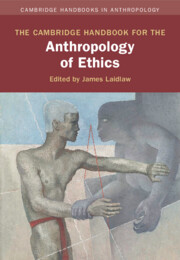Book contents
- The Cambridge Handbook for the Anthropology of Ethics
- Cambridge Handbooks in Anthropology
- The Cambridge Handbook for the Anthropology of Ethics
- Copyright page
- Contents
- Contributors
- 1 Introduction
- Part I Intellectual Sources and Disciplinary Engagements
- 2 Moral and Political Philosophy
- 3 Virtue Ethics
- 4 Agonistic Pluralists
- 5 The Two Faces of Michel Foucault
- 6 Phenomenology
- 7 Cognitive Science
- 8 Theology
- Part II Aspects of Ethical Agency
- Part III Media and Modes of Ethical Practice
- Part IV Intimate and Everyday Life
- Part V Institutional Life
- Index
- References
3 - Virtue Ethics
from Part I - Intellectual Sources and Disciplinary Engagements
Published online by Cambridge University Press: 11 May 2023
- The Cambridge Handbook for the Anthropology of Ethics
- Cambridge Handbooks in Anthropology
- The Cambridge Handbook for the Anthropology of Ethics
- Copyright page
- Contents
- Contributors
- 1 Introduction
- Part I Intellectual Sources and Disciplinary Engagements
- 2 Moral and Political Philosophy
- 3 Virtue Ethics
- 4 Agonistic Pluralists
- 5 The Two Faces of Michel Foucault
- 6 Phenomenology
- 7 Cognitive Science
- 8 Theology
- Part II Aspects of Ethical Agency
- Part III Media and Modes of Ethical Practice
- Part IV Intimate and Everyday Life
- Part V Institutional Life
- Index
- References
Summary
Virtue ethics has been a key concern of some important modern thinkers such as Michel Foucault, Bernard Williams, Martha Nussbaum, and Alasdair MacIntyre. Anthropologists have disagreed strongly over whether the categories developed by such writers are useful or a source of ethnocentric distortion when applied to ethnographic and comparative work. This chapter argues for a middle course. Virtue seems to be a universal concern, but in order to understand it cross-culturally it will be necessary to develop a ‘virtue ethics as such’: an understanding that transcends the culture-bound assumptions of modern virtue ethicists. At the same time, those thinkers were concerned to escape from certain limited ways of thinking about ethics that have also stunted anthropological work on morality, so they may provide a uniquely useful starting point for our investigations. Having set this challenge, the chapter goes on to provide some preliminary thoughts on how an anthropology of virtue ethics as such could be pursued, considering concepts such as ‘exemplarity’ and ‘the fragility of the good’ from a comparative point of view, drawing on Confucian, Buddhist, and other traditions.
- Type
- Chapter
- Information
- The Cambridge Handbook for the Anthropology of Ethics , pp. 65 - 95Publisher: Cambridge University PressPrint publication year: 2023

